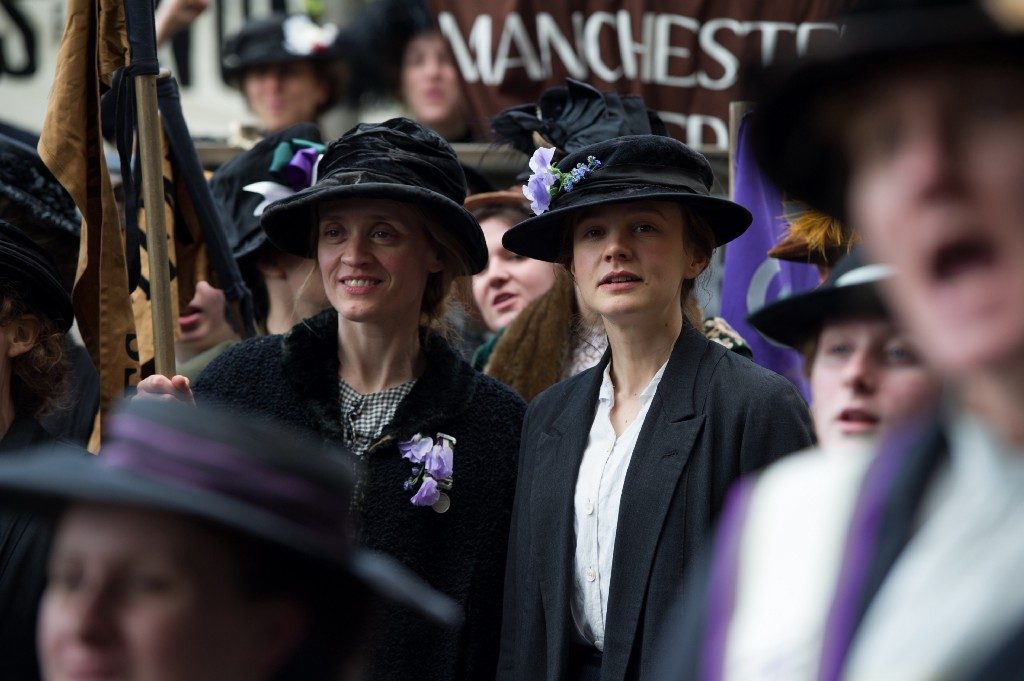Sarah Gavron’s feature film debut was “Brick Lane,” which earned her a BAFTA nomination, a BIFA nomination and The Alfred Dunhill Talent Award at the BFI London Film Festival. Prior to this, Gavron’s first full-length drama, the Denis Potter Award-winning “This Little Life” for BBC, won her the TV BAFTA for Best New Director and both the Royal Television Society and Women in Film and TV Award for Best Newcomer. Gavron was selected as one of Variety’s ten directors to watch at the Sundance International Film Festival. Her feature documentary, “The Village at the End of the World,” was nominated for The Grierson Award and won the prestigious Margaret Mead Award. Gavron is currently developing an adaptation of the novel “The Unlikely Pilgrimage of Harold Fry” with Film4. (Press materials)
“Suffragette” will premiere at the 2015 BFI London Film Festival on October 7 and open stateside on October 23.
W&H: Please give us your description of the film playing.
SG: “Suffragette” is an intense drama that tracks the story of the foot soldiers of the early feminist movement as they fight for the right to vote. The film follows a group of East London working women who were forced underground to pursue a dangerous game of cat and mouse with an increasingly brutal state. Having seen peaceful protest achieve nothing, they turned to violence as the only route to change, at great personal cost — losing their jobs, homes and families.
The character of Maud, played by Carey Mulligan, is one such foot soldier. The story of her fight for dignity is both heartbreaking and inspirational.
W&H: What drew you to this story?
SG: I had wanted to make this film for over a decade. There has never been a cinematic rendition of this story. I had not been taught any of the history of the movement at school, and the version I had gleaned had been the Mary Poppins story of women in large hats, petitioning. There was another version, and it was that [one] that the team and I wanted to tell.
We discussed endlessly how to get inside the hearts and minds of these women who broke every taboo in order to be heard, who committed arson, endured police violence, imprisonment, went on hunger strikes and were repeatedly force-fed. They were women who were prepared to risk so much; many lost jobs, homes, families and children in the battle.
The story seemed to grow ever more timely as we worked on it. World events echoed it. The challenging of repression by a new generation of activists — from Malala Yousafzai to Pussy Riot — across the globe reminded us how many women are still fighting for basic human rights. Our great-grandmothers’ struggle in all its shocking detail seemed so relevant.
W&H: What was the biggest challenge in making the film?
SG: The suffragettes were women of action. Their motto was “Deeds not Words,” and the film reflects that with a number of big set pieces, from the smashing of windows in central London to a riot at the Houses of Parliament. Those were the sequences that were the biggest challenges, as they involved stunts, hundreds of supporting artists, horses and vehicles, special effects and visual effects. We petitioned to get access to film at the Houses of Parliament and we whooped with joy when we were allowed in, as this is the first ever commercial film to shoot there.
W&H: What do you want people to think about when they are leaving the theater?
SG: I want them to be inspired! To remember how hard-fought the battle for the vote was, the debt we owe to women who paved the way for this more egalitarian society we live in, how critical it is to use our vote and to be counted.
We have come far, but there is an ongoing battle to be fought. Many of the issues the Suffragettes were dealing with are still issues today across the globe: equal pay, parental rights, sexual abuse, etc.
W&H: What advice do you have for other female directors?
SG: It is about holding on to your vision and not giving up. Surround yourself with people who support you. Find champions.
W&H: How did you get your film funded? Share some insights into how you got the film made.
SG: The development was funded by Film 4 and Focus Features. Then Pathe came onboard and moved it in to production and the BFI and Ingenious also joined. Focus is now distributing it in the States.
W&H: Name your favorite woman-directed film and why.
SG: It has to be “The Piano” by Jane Campion. It inspired me to pursue my dream to direct. It is not just my favorite woman-directed film — it is my favorite film.
Many other women have been an inspiration: Larisa Shepitko, Mira Nair, Claire Denis, Sally Potter, Samira Makhmalbaf and more. Kathryn Bigelow has also been an inspiration — she is an incredible filmmaker.







